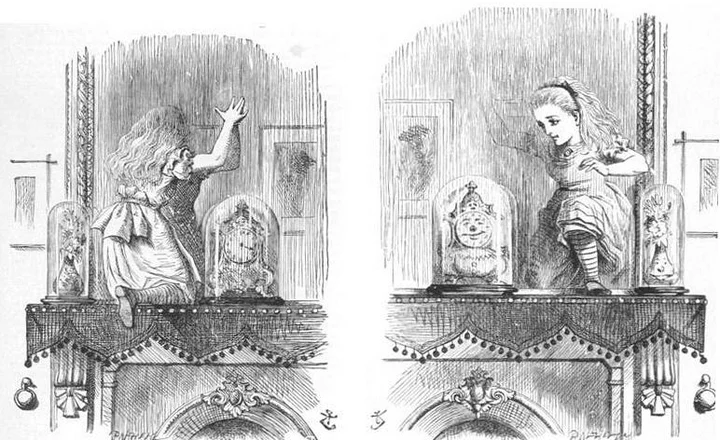“The multiverse is undoubtedly catchy. It appeals to a generation that has grown up with (among other things) the Marvel Cinematic Universe; an audience fascinated by the notion that the multiverse of Doctor Strange might actually be true.”
— Jim Baggott, science writer, in Prospect
###
Between the MCU, “The Man in the High Castle,” and a bunch of otherwise sober-minded theoretical physicists*, multiverse theories seem to have become entrenched in the popular worldview of our time. They’re also pseudoscientific bullshit. Lacking a scrap of empirical evidence, any multiverse theory shares the same memespace as astrology, god or Tinkerbell.
* Like Brian Green, cosmologist and science popularizer, who says that multiverses “are turning out to be harder to avoid than they are to find.”
Alice entering the looking-glass world, an alternative universe dreamed up by Lewis Carroll in the 1870s, as illustrated by John Tenniel. (Check out Mirror, Mirror from the original Star Trek series.) (Public domain)
The most general idea is that multiverses solve the “fine-tuning problem”: We live in a Goldilocks universe, one in which the physical constants that shaped its evolution to allow for us must have been fine-tuned — they’re just right — otherwise we wouldn’t be here. Change any of those constants by a smidgen, and you wouldn’t get hydrogen atoms, or stars, or sufficient time for life to evolve. According to the multiverse theory, the only way for our universe to be so finely tuned is that there are zillions (perhaps an infinity) of universes, and that at least one of them — ours, for instance — happens to have the right conditions to spawn intelligent life. If, on the other hand, there’s only one universe, the odds of it having just those tightly-constrained conditions is too unlikely.
The flaw here is that we have no idea whether the conditions in our universe are likely or unlikely, since we only have a sample of one. The only way to judge odds is to take a representative sample. (If you’d never seen a coin before, and you observed a single flip of a coin landing heads, by that reasoning, you’d assume all flips would come up heads.)
So you don’t need multiverses. It may be that our universe is the way it is because it’s the way it is. No problem, nothing to explain. See this for a fuller discussion.
Another reason given as evidence for multiverses is that they solve the so-called “measurement problem” of quantum mechanics. The “many worlds” interpretation of QM says that, every time a measurement is made, like a photon traveling through one of two slits, two (or more) universes appear, with each outcome happening in its own brand-new universe. But we only see one of them. According to this version of many worlds, anything that is possible is real, in some universe; in another universe, your doppelganger is reading this right-to-left.
This, like the many other ideas supporting the multiverse theory, suffers from the same problem: multiverses are unobservable. They’re completely, 100% undetectable, now or ever. (If they were detectable, they wouldn’t be multiverses, they’d be part of our universe.) Since, by definition, they’re disconnected from our universe, no observation can ever prove their existence, and to claim otherwise is not scientific. But by the same token, it’s unscientific to claim their non-existence, either. Like god (or fairies, or the simulation hypothesis, or the flying spaghetti monster) multiverses are ascientific: Science has nothing to say about them one way or the other. If you want to believe in them, there’s probably no harm in it, like belief in Tinkerbell (which makes her real!). Unlike believing in, say, a vengeful god watching your every move, which can cause real harm.
Bottom line: Since there’s no possible way to detect or even to test for multiverses, they’re metaphysical, outside of the purview of science.
###
NOTE: None of which takes anything away from my heartthrob Michelle Yeoh, who discovered her many alter egos (besides that of an overwhelmed laundromat owner) in the parallel universes of Everything Everywhere All at Once, winner of seven Oscars. Not to mention Jamie Lee Curtis. Loved it!

CLICK TO MANAGE